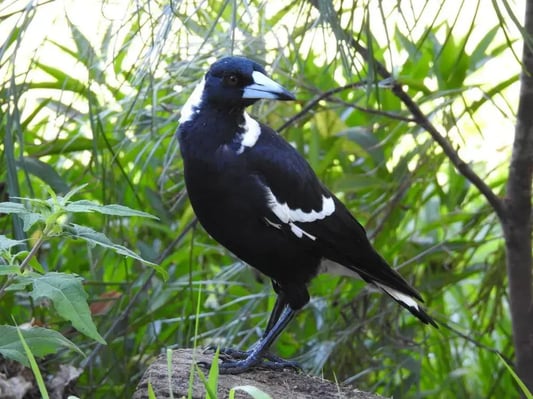swooping
magpies
- Home
- What We Do
- Wildlife Information
- General Information
- Swooping Magpies
Australian Magpies are intelligent, social birds that form long-lasting pair bonds and keep the same territory year after year. They raise their young together, often with the help of older juveniles from previous seasons. These extended family groups work together to keep chicks safe and teach them how to survive in the wild.
Magpies play a valuable role in the environment. They are natural pest controllers, reducing insect populations, and are known for their beautiful singing that fills our suburbs with familiar carolling. The playful antics of their young are a joy to observe as they explore their world for the first time.
Australian Magpies are intelligent, social birds that form long-lasting pair bonds and keep the same territory year after year. They raise their young together, often with the help of older juveniles from previous seasons. These extended family groups work together to keep chicks safe and teach them how to survive in the wild.
Magpies play a valuable role in the environment. They are natural pest controllers, reducing insect populations, and are known for their beautiful singing that fills our suburbs with familiar carolling. The playful antics of their young are a joy to observe as they explore their world for the first time.
Why do magpies swoop? Understanding magpie behaviour during "Swooping Season"
Magpies usually lay their eggs between August and December, which marks the beginning of magpie swooping season. During this time, male magpies become more protective than usual, using swooping as a natural defense to keep their nests, eggs and chicks safe. This behaviour is temporary and usually lasts only a few weeks, up until the chicks have left the nest.
Magpies have excellent memories and are believed to be able to distinguish between people and so can identify unknown individuals whom they perceive as intruders. If a magpie or its chicks have been frightened or harmed in the past, it may begin to see certain people or actions as a threat. This is why some individuals, such as cyclists or children in school uniforms, may be targeted while others are left alone.
When magpies defend their nest, they usually give a warning first. This may start with carolling or clapping their beak. If the person does not move away, the magpie may swoop low as a second warning. In rare cases, if the bird feels the nest is under immediate threat, it may make contact.

Credit: Sharon McGrigor
Strategies to avoid being swooped include:
- During breeding season, avoid the area where the magpies are nesting
- Don’t behave aggressively towards them by waving sticks or throwing stones as this only reinforces their perception of humans as threats
- Avoid approaching or trying to look into the nest and avoid making eye contact
- Respect their warning signals and move further away
- Don’t speed through on a bike, as this attracts their attention.
You can protect yourself by:
- Wear a hat or use an umbrella while in the area
- Wear sunglasses to protect your eyes
- Cyclists should dismount and walk (most cyclist injuries result from trying to avoid the Magpies, not from actual Magpie attacks).
Legal Protections and Ethical Considerations
It is not recommended to remove a swooping male parent from a known nesting area as the female magpie will be left without a partner to protect her and their territory. Their eggs will either fail to hatch or the young will die of starvation and/or exposure without both parents. If their territory is vacated, it will be claimed by other magpies seeking a nesting site. If only the nest is removed, the birds will build another one in the same area. Removing a nest will reinforce the magpies' defensive behaviour and extend their breeding season.
Please remember that just like any other caring parent, swooping magpies are not targeting you personally, they are simply protecting their young from a perceived threat and this behaviour will only last for a few weeks.
WIRES does not recommend feeding any native birds. While encouraging wild birds to come to us for food can make us feel special, it is not in the best interest of the birds. We must put their long term needs first.
- As their food needs to comprise a nutritionally balanced natural diet such as insects, earthworms and spiders. If adult magpies feed their young with human-sourced food, the chicks are likely to be malnourished and develop diseases such as metabolic bone disease.
- Many countries in the northern hemisphere encourage feeding birds through their harsh winters. In Australia with our milder climate, our native birds have evolved very different diets.
- Many birds will take advantage of free food, but this impacts their long-term health. Also remember that while you may be feeding only a little incorrect food, some birds will visit multiple gardens with others doing the same thing.
The best thing to do to help is provide fresh drinking water daily. Keep a compost heap that you turn over from time to time. Show friendly intentions by putting out fresh water, having a compost heap, or digging or turning over sections of your garden to expose worms.
WIRES is sadly seeing an increase in humanised and imprinted magpies. These are chicks that have been hand-raised by well-meaning members of the public and have sadly lost their 'wildness'. They are unlikely to be accepted by wild magpies and have little chance of pair bonding and raising their own families. Magpies must not be converted into pets. It is illegal to take animals from the wild and keep them in captivity.
15 Ways to Help Wildlife
Sign up to receive our monthly eNewsletter with wildlife rescue stories and updates on our work rescuing, rehabilitating, and releasing native wildlife.
